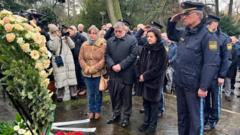In response to a deadly knife incident that claimed two lives in Aschaffenburg, Friedrich Merz, the conservative opposition leader and a key contender for the chancellorship in next month’s elections, has unveiled a drastic plan to tighten Germany's border and asylum regulations. He pledged to effectively close the nation’s borders to irregular migrants, even those who are seeking protection.
The knife attack, which occurred when a two-year-old Moroccan boy and a 41-year-old man were killed, has intensified the discourse surrounding immigration policies in Germany. An Afghan man, 28, has been charged with murder and aggravated assault in connection with the incident. He is noted to have arrived in Germany in 2022 and has links to previous violent acts. Despite his order to leave the country, he was still situated in an asylum housing, receiving psychiatric care.
Chancellor Olaf Scholz described the attack as a “terror act” amidst calls for rapid policy changes by both himself and Merz. Scholz has faced criticism from all sides as the incident echoes previous attacks connected to asylum seekers, drawing a hardline response from the political establishment.
Merz, whose party, the Christian Democrats, currently leads in polls before the elections scheduled for February 23, suggested that on his first day in office, he would direct the interior ministry to take full charge of border security, labeling the preceding decade of immigration policy as “misguided.” His proposal includes reinstating checks and enhancing detention facilities for deportations, challenging EU asylum regulations which he criticized for being dysfunctional.
This proposed closure of borders carries a similar tone to policies seen in the U.S., as both leaders scramble for votes in a climate increasingly influenced by the far-right Alternative for Germany (AfD). The AfD’s push for immediate parliamentary discussions on border closures following the Aschaffenburg attack reflects growing tensions around immigration in the German political landscape.
Critics of Merz’s tougher stance suggest that it emerges too late in response to longstanding issues. Nevertheless, shifts in policies may inadvertently bolster AfD’s narrative regarding immigration. Political analysts note that the realities of coalition governance in Germany may complicate Merz’s ability to enact such harsh reforms, especially if he aligns with more liberal parties.
As the nation grapples with the repercussions of the tragic attack, community responses are also emerging. The 41-year-old victim hailed as a hero for attempting to protect children during the attack, indicates the profound impact of the incident on public consciousness and the ongoing debates surrounding immigration and security in Germany.
The knife attack, which occurred when a two-year-old Moroccan boy and a 41-year-old man were killed, has intensified the discourse surrounding immigration policies in Germany. An Afghan man, 28, has been charged with murder and aggravated assault in connection with the incident. He is noted to have arrived in Germany in 2022 and has links to previous violent acts. Despite his order to leave the country, he was still situated in an asylum housing, receiving psychiatric care.
Chancellor Olaf Scholz described the attack as a “terror act” amidst calls for rapid policy changes by both himself and Merz. Scholz has faced criticism from all sides as the incident echoes previous attacks connected to asylum seekers, drawing a hardline response from the political establishment.
Merz, whose party, the Christian Democrats, currently leads in polls before the elections scheduled for February 23, suggested that on his first day in office, he would direct the interior ministry to take full charge of border security, labeling the preceding decade of immigration policy as “misguided.” His proposal includes reinstating checks and enhancing detention facilities for deportations, challenging EU asylum regulations which he criticized for being dysfunctional.
This proposed closure of borders carries a similar tone to policies seen in the U.S., as both leaders scramble for votes in a climate increasingly influenced by the far-right Alternative for Germany (AfD). The AfD’s push for immediate parliamentary discussions on border closures following the Aschaffenburg attack reflects growing tensions around immigration in the German political landscape.
Critics of Merz’s tougher stance suggest that it emerges too late in response to longstanding issues. Nevertheless, shifts in policies may inadvertently bolster AfD’s narrative regarding immigration. Political analysts note that the realities of coalition governance in Germany may complicate Merz’s ability to enact such harsh reforms, especially if he aligns with more liberal parties.
As the nation grapples with the repercussions of the tragic attack, community responses are also emerging. The 41-year-old victim hailed as a hero for attempting to protect children during the attack, indicates the profound impact of the incident on public consciousness and the ongoing debates surrounding immigration and security in Germany.



















